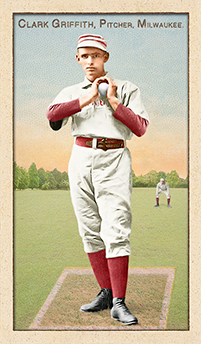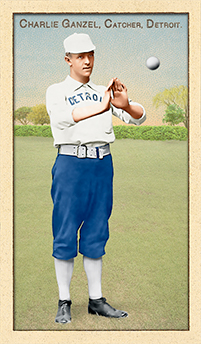
- Series: Beginnings: 1880's
- City: Detroit
- Team: Wolverines
- League: National League
Charles William Ganzel (1862-1914) was reared in Kalamazoo with nine siblings, part of what would be called the “First Family” of Michigan baseball. Charlie had the longest major league career, 14 seasons, with his best coming with the Wolverines and Beaneaters for whom he served nine years behind the plate. Usually a reliable reserve, Ganzel had to step up when longtime teammate Charlie Bennett lost both legs in a train accident. The duo had moved from Detroit to Boston as part of the then highest-cost foursome sold: $30,000. They had split the duties in 1887 when the Wolverines reached their peak, winning the NL flag and defeating the Browns in the post-season. Charlie’s years in Boston were very productive with three more pennants. A lifetime .259 BA testified to his skill offensively and he was always praised for his defense.
- Brother John saw major-league experience as did son Foster who followed 43 years after Dad’s debut, still the longest gap for father/son major-league debuts
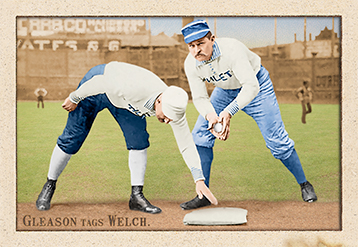
- Series: 1880s: Diamond Duos
- City: Philadelphia
- Team: Athletics (AA)
- League: American Association
Bill Gleason:
William G. Gleason (1858-1932) was an American Association shortstop for three teams from 1882-89. During those eight seasons Gleason hit .267. He debuted with his hometown St. Louis Brown Stockings and participated in their three pennants in '85, '86 and '87. He was an everyday player and increased the number of games played every year with the club, culminating in '87 when he appeared in 135 games with a fine .288 average. St. Louis management must have anticipated a decline was in store. He was traded to Philadelphia's Athletics in '88, where his hitting fell off to .224. Philly dealt him to the Louisville Colonels for his final campaign. Gleason saw action in only 16 games in 1889. He stayed in pro ball for two more minor league seasons with Washington of the Atlantic Association in 1890 and finished up with the Rockford Hustlers of the Illinois-Iowa League the following year where he recorded by far the highest average on a squad that included eight other past or future big leaguers.
- In a storied and rowdy “championship” contest following the 1885 season, Gleason's Browns vied with the formidable White Stockings. Bill was at the center of the storm as his throw to first was ruled late, infuriating the home folks and precipitating a long row in which Cap Anson refused to allow the Chicago umpire to be replaced. Comiskey called his team off the field which led to a forfeit of the first game. The “Series” ended in a tie.
Curt Welch:
Curtis Benton Welch (1862-1896). Primarily a center fielder for 10 professional seasons, Welch was a fast runner with great instincts. His “$15,000 slide” into home clinched the 1886 World Series for the St. Louis Browns. It has been called the most famous play of the 19th century.
- Top 10 in steals 6 years in a row
- Currently ranks 51st all-time in steals (453)
- Alleged to have hidden beer behind billboards so he could drink during games
Auction History
Cartophilia
Old Judge Pose: 485-7
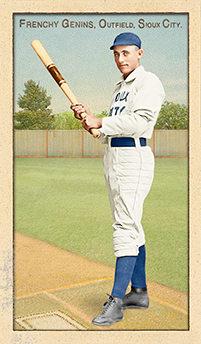
- Series: Beginnings: 1880's
- City: Sioux City
- Team: Corn Huskers
- League: Western Association
C. Frank Genins (1866-1922) had a modest career as a utility fielder for three major league clubs in the 1890s. Frenchy had started out getting paid to play ball with the Omaha Omahogs of the Western League in 1887, en route to a total of 16 years in the minors. He concluded his playing days with the Racine Belles of the Wisconsin-Illinois League in 1909, having also managed in his latter seasons for three teams. Whether in the farm leagues or the bigs, Genins was consistently mediocre at the plate. His MLB average was .226. His most plate appearances came with Sioux City in 1894 where Frenchy had his best output, batting .374 with seven home runs. He exceeded .300 a couple other times so he had some decent seasons along the way. Genins’ stints in the majors were with his hometown Browns in ‘92 (one game?), the Reds for a longer trial that year, the Pirates in ‘95 and with Cleveland’s Blues in 1901. Frenchy had a respectable season in Pittsburgh, hitting .250, playing seven positions, and was the only outfielder to spell the team’s beloved trio of Mike Smith, Patsy Donovan and Jake Stenzel.
- Frenchy has five known poses in the Old Judge series and all five come in a curious variant: Genins is oftentimes misspelled as "Genius." The editors of the Photographic Baseball Cards of Goodwin & Co. conclude that the misspelling is an error, but I am inclined to disagree. Considering the amount of intentional humor interspersed throughout the Old Judge canon, the fact that the misspelling is prevalent across Frenchy's entries, and perhaps most tellingly that one must only flip an "n" upside down in Genins to turn Frenchy into a "Genius" - and I am inclined to believe that this misspelling was indeed purposeful at the hands of the Goodwin pranksters.
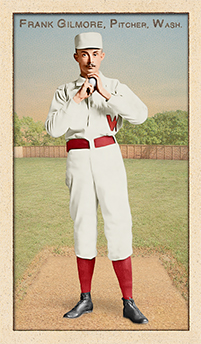
- Series: Beginnings: 1880's
- City: Washington, D.C.
- Team: Nationals
- League: National League
Franklin T. Gilmore (1864-1929) was nicknamed “Shadow” and cast a giant one with Washington when he formed the “Grasshopper Battery” (per John Thorn) or the “bones battery” as dubbed by early journalists, with catcher Connie Mack. The two made a striking pair: angular stringbeans of sinew and bone. Gilmore debuted in D.C. in 1886. There is dispute as to whether the Nationals wanted Gilmore or Mack more, but they came as a tandem and would be such during Frank’s all-too-brief sojourn in the majors. The battery-mates from Hartford’s Dark Blues’ ‘86 team were not only similar in build and stature, they were very close as roommates. Years later, Mr. McGillicuddy would reminisce about spending all night rubbing Gilmore’s arm with liniment in what proved a vain effort to prolong the young phenom’s career. Shadow reached a pinnacle on September 28 that rookie year when he fanned 16 St Louis Maroons, equaling the year’s best strikeout performance. Perhaps foreshadowing the young hurler’s future, the Nationals lost the contest 5-2, giving Gilmore poor support.
- The slender pitcher’s ML record proved slim as well: three seasons with Washington, 12 wins against 33 losses, a 4.26 ERA with 212 Ks in 405 innings
- On a side note, Bill James ranked Gilmore the worst professional baseball player of the 19th century
- Series: Beginnings: 1880's
- City: Milwaukee
- Team: Creams
- League: Western Association
- Hall: National Baseball Hall of Fame
Clark Calvin Griffith (1869-1955) was a successful pitcher for over 20 years but had only just begun his baseball career. AL founder Ban Johnson prevailed on Griffith to take the helm of the NY entry into the new league in 1903. That began a tenure as manager and owner that lasted until Griffith’s death in 1955. With a showman’s touch and a veteran player’s savvy, Griffith turned around the D.C. franchise.
- Only one in history to be a player, manager and owner for over 20 years in each role
- Counted eight U.S. presidents as friends during his long tenure as owner of the Senators
- Elected to Hall of Fame: 1946
- Griffith's uniform color in this card was changed from blue to red in March, 2017 to reflect recent reliable research conducted by Craig Brown and friends at Threads of Our Game. Three cards had been previously released featuring a blue uniform.




